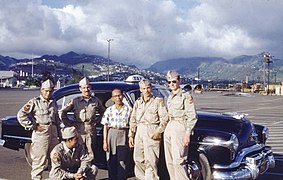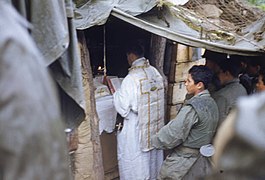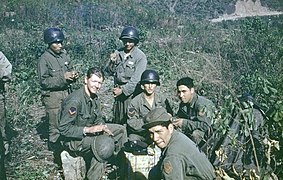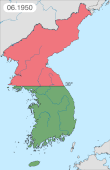Colombian Battalion Active 1951–1954 Country Allegiance Branch Size
5,100 soldiers
300 sailors Engagements Korean War
Military unit
The Colombian Battalion was an infantry battalion of the Colombian Army that served under United Nations Command during the Korean War from 1951 to 1954. The first Colombian military unit to serve in Asia, the battalion was attached to the U.S. 7th Infantry Division and 25th Infantry Divisions .[ 1] [ 2]
Background
The election of President Laureano Gómez in 1950 sparked renewed interest in building up Colombia–United States relations . Gómez wanted greater U.S. economic support in exchange for direct involvement as an ally, and a means to erase any lingering impressions caused among U.S. policymakers of his previous attitude of anti–U.S. and pro–German sentiment during the World Wars.[ 3]
Gómez emphasized the importance of the United Nations security charter and the concept of collective security. As such, he pushed the military to form an expeditionary force that could be deployed on behalf of the United Nations. The overall strength of the battalion was between 4,314 or 5,100 infantry soldiers and 300 sailors on board the frigates ARC Almirante Padilla , ARC Capitán Tono , and ARC Almirante Brión .[ 4] Mexico , Argentina , and Brazil to collaborate and contribute a regiment, but they all declined to fight except for Colombia. Most of the equipment in the battalion was WW2 American weapons such as the M2 carbine and 1911 .
Korean War
Following the outbreak of the Korean War, the Colombian Battalion was deployed to Busan on 15 June 1951 under the command of Colonel Jaime Polanía Puyo.[ 1] Operation Thunderbolt , the Battle of Old Baldy , the Battle of Triangle Hill and the recapture of Kumsong through Operation Nomad-Polar .[ 5] [ 6] [ 7]
The Battle of Old Baldy was particularly notable for the battalion, as the unit lost (killed or wounded) 20% of its deployed strength in the engagement.[ 8]
Casualties
The Colombian Battalion suffered men 163 killed in action, 448 wounded, 60 missing, and 30 captured over the course of the conflict.[ 2]
Commanders
See also
Gallery
Colombians in Hawaii
Colombian soldiers with a Chinese prisoner
bombardment by Colombian soldiers
chaplain along with battalion soldiers
soldiers in training
soldiers in training
Further reading
The History of the UN Forces in the Korean War-3 (Belgium, Colombia, France, Greece, Luxembourg, Netherlands, Denmark, Italy, Norway, Sweden) - ROK Ministry of National Defense Institute for Military History, 1974 (E-BOOK) Archived 2023-07-09 at the Wayback Machine The History of the UN Forces in the Korean War-3 (Belgium, Colombia, France, Greece, Luxembourg, Netherlands, Denmark, Italy, Norway, Sweden) - ROK Ministry of National Defense Institute for Military History, 1974 (PDF) Archived 2023-06-05 at the Wayback Machine The History of the UN Forces in the Korean War-6 (Summary) - ROK Ministry of National Defense Institute for Military History, 1977 (E-BOOK) Archived 2023-07-09 at the Wayback Machine The History of the UN Forces in the Korean War-6 (Summary) - ROK Ministry of National Defense Institute for Military History, 1977 (PDF) Archived 2023-06-28 at the Wayback Machine
The Korean War and the UN Forces - ROK Ministry of National Defense Institute for Military History, 2015 (E-BOOK) Archived 2023-07-09 at the Wayback Machine (in Korean) The Korean War and the UN Forces - ROK Ministry of National Defense Institute for Military History, 2015 (PDF) Archived 2023-07-09 at the Wayback Machine (in Korean) The Statistics of the Korean War - ROK Ministry of National Defense Institute for Military History, 2014 (E-BOOK) Archived 2023-07-09 at the Wayback Machine (in Korean) The Statistics of the Korean War - ROK Ministry of National Defense Institute for Military History, 2014 (PDF) Archived 2021-01-11 at the Wayback Machine (in Korean) The History of the UN Forces in the Korean War - ROK Ministry of National Defense Institute for Military History, 1998 (E-BOOK) Archived 2023-07-09 at the Wayback Machine (in Korean) The History of the UN Forces in the Korean War - ROK Ministry of National Defense Institute for Military History, 1998 (PDF) Archived 2023-07-09 at the Wayback Machine (in Korean) The Summary of the Korean War - ROK Ministry of National Defense Institute for Military History, 1986 (PDF) Archived 2023-07-09 at the Wayback Machine (in Korean) The History of the Korean War-10: The UN Forces (Australia, Belgium, Luxembourg, Canada, Colombia, Ethiopia, France, Greece, Netherlands) - ROK Ministry of National Defense Institute for Military History, 1980 (E-BOOK) Archived 2023-06-24 at the Wayback Machine (in Korean) The History of the Korean War-10: The UN Forces (Australia, Belgium, Luxembourg, Canada, Colombia, Ethiopia, France, Greece, Netherlands) - ROK Ministry of National Defense Institute for Military History, 1980 (PDF) Archived 2023-06-05 at the Wayback Machine (in Korean)
References
^ a b Saldaña, Juliana (2013-04-02). "Colombia's legacy with Korea | The City Paper Bogotá" . The City Paper Bogotá . Retrieved 2017-02-15 . ^ a b Coleman, B. L. (October 2005). "The Colombian Army in Korea, 1950–1954". The Journal of Military History 69 (4): 1137– 1177. doi :10.1353/jmh.2005.0215 . S2CID 159487629 . ^ Bushnell, Davis. The Making of Modern Colombia .
^ "Medal Hound" . themedalhound.com . Retrieved 2017-02-15 .^ Operation Nomad-Polar - The 24th Infantry Division Association ^ United States Army Center of Military History, Korea 1951–1953, US Government Printing Office, Washington DC, 1996, p. 278
^ Guerra en Corea El Batallón Colombia" (in Spanish). Archived from the original on October 30, 2013^ United States Army Center of Military History, Korea 1951–1953, US Government Printing Office, Washington DC, 1996, p. 278
















